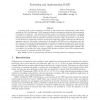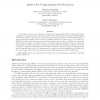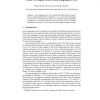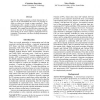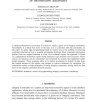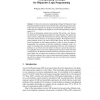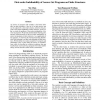128
click to vote
FUIN
2010
14 years 11 months ago
2010
In previous work we have proposed an extension to ASP (Answer Set Programming), called RASP, standing for ASP with Resources. RASP supports declarative reasoning on production and...
143
click to vote
KR
2010
Springer
14 years 12 months ago
2010
Springer
In this paper, we propose a progression semantics for firstorder answer set programs. Based on this new semantics, we are able to define the notion of boundedness for answer set p...
131
click to vote
LOGCOM
2010
15 years 15 days ago
2010
In this paper, we propose an extension of Answer Set Programming (ASP) to support declarative reasoning on consumption and production of resources. We call the proposed extension ...
183
click to vote
JELIA
2010
Springer
15 years 15 days ago
2010
Springer
Action languages allow for compactly describing dynamic domains. They are usually implemented by compilation, e.g., to Answer Set Programming. To this end, we developed a tool, cal...
131
click to vote
CORR
2010
Springer
15 years 20 days ago
2010
Springer
We show that global constraints on finite domains like alldifferent can be reformulated into answer set programs on which we achieve arc, bound or range consistency. These reform...
145
click to vote
CORR
2002
Springer
15 years 1 months ago
2002
Springer
A relational database is inconsistent if it does not satisfy a given set of integrity constraints. Nevertheless, it is likely that most of the data in it is consistent with the co...
112
click to vote
AICOM
2006
15 years 2 months ago
2006
In this work we present a backjumping technique for Disjunctive Logic Programming (DLP) under the Answer Set Semantics. It builds upon related techniques that had originally been p...
128
click to vote
CORR
2008
Springer
15 years 2 months ago
2008
Springer
The paper introduces the notion of off-line justification for Answer Set Programming (ASP). Justifications provide a graph-based explanation of the truth value of an atom w.r.t. a ...
103
click to vote
AAAI
2010
15 years 2 months ago
2010
An answer set program with variables is first-order definable on finite structures if the set of its finite answer sets can be captured by a first-order sentence, otherwise this p...
133
click to vote
AAAI
2006
15 years 3 months ago
2006
Recent research shows that SAT (propositional satisfiability) techniques can be employed to build efficient systems to compute answer sets for logic programs. ASSAT and CMODELS ar...
